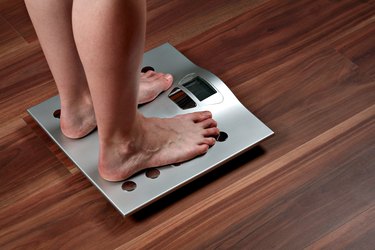
Even if your weight loss result is seeing bones you might not know or remember you have, those bones have been there the whole time. Weight loss does not make your bones move. Your skeletal system is in place when you're born and it stays in place no matter how fat or skinny you get. Bones can, however, go through other changes during weight loss.
Extreme Proof
Video of the Day
Starvation is an extreme example of weight loss and even it does not make your bones move. Your body reacts to starvation's severe malnutrition by feeding off its own fat and tissue, but not your bones. Starvation can shrink your muscles as well as your heart, lungs and other vital organs, which eventually stop working. You can become weak and anemic, and your digestive system can stop producing acid, making digestion difficult or impossible.
Video of the Day
On the mental side, starvation can make you irritable, confused and eventually prone to hallucinations. Despite the body's drastic changes, the bones stay in their original places.
Original Placement
Your skeletal system keeps the same layout it had on the day you were born, regardless of growth, weight loss or gain. The 206 bones that make up your body start out as cartilage and eventually harden, or ossify. They stay connected together with ligaments at the joints. Bones do not need to move when you develop from childhood into adulthood because they include growth plates which allow the bones to get bigger without changing your skeletal structure. They cannot move when you lose weight because they are held firmly in place by your ligaments.
What Does Change
Although your bones don't move when you lose weight, they can change their density. A study published in a 1998 issue of "American Journal of Clinical Nutrition" examined the effects of weight loss on 14 women with obesity. The study found that, although the women's bone mineral content stayed the same during their weight loss, the bone mineral density decreased.
Bones also contain living cells that constantly renew themselves. Your bones' osteoblasts help fix any damage, their osteocytes bring nutrients into and waste out of your bones' blood vessels and the osteoclasts break down old bone so new bone can form.
Considerations
Since your bone density can decrease during weight loss, it's vital to keep your bones strong if you're planning on dropping pounds. The University of Missouri recommends high-impact weight-bearing exercises and keeping an eye on your calcium intake. High-impact, weight-bearing exercises include jogging, running or other aerobic activity in which your skeletal system is supporting your weight. The Recommended Dietary Allowance for calcium ranges from 1,000 mg to 1,300 mg per day, depending on your age.
- Encyclopedia.com: Starvation
- Kids Health: Body Basics – Bones, Muscles, Joints
- “American Journal of Clinical Nutrition”; Effect of Weight Loss on Bone Mineral Content and Bone Mineral Density in Obese Women; Teresa Barbieri, et al.; 1998
- University of Missouri: Accelerated Bone Turnover Remains after Weight Loss